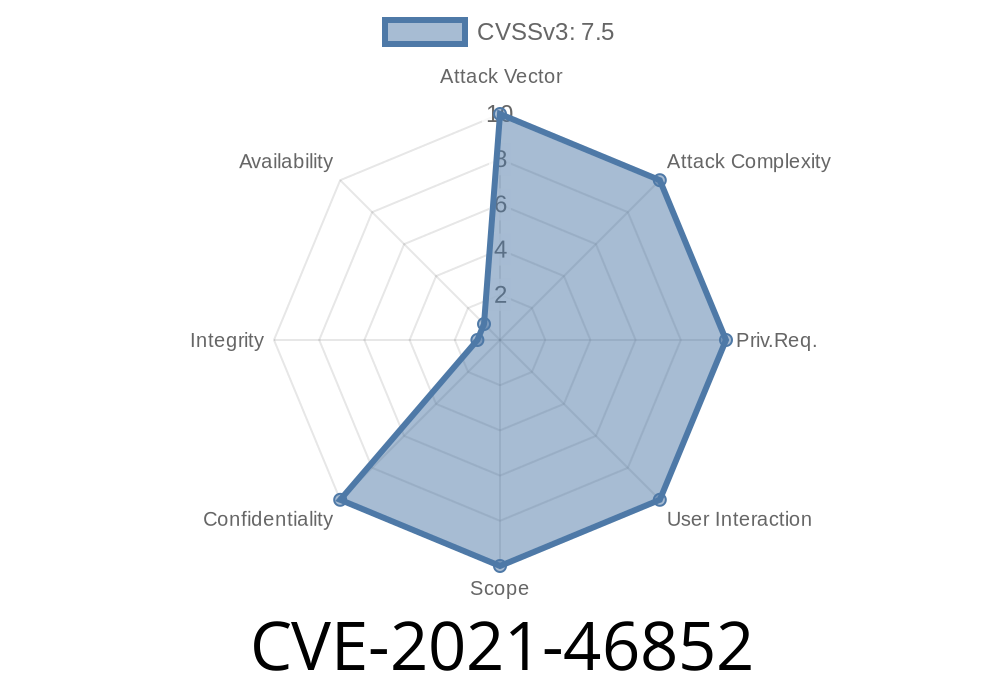In the ever-evolving world of cybersecurity, new vulnerabilities are discovered every day. One notable entry is CVE-2021-46852, which impacts the memory management module of certain software products. In this long read, we’ll break down what the vulnerability is, how an attacker can exploit it, and what you can do to secure your systems.
What is CVE-2021-46852?
CVE-2021-46852 is classified as a *logic bypass* vulnerability within the memory management component of affected products (such as some embedded systems, servers, or custom enterprise applications). In simple terms, the “memory management module” is responsible for handling how programs use memory in a system, including who can access what data at what times.
This vulnerability arises because the memory management logic can be tricked or “bypassed” by a specially crafted request from an attacker. When exploited, it allows unauthorized access to sensitive sections of memory, which can lead to data exposure and breaches of confidentiality.
Technical Details
The crux of CVE-2021-46852 lies in flawed access validation. Typically, a memory management routine would use strict checks to ensure only authorized users/processes can read or write to certain memory chunks. In affected systems, there’s a failure in that logic—certain edges cases or request sequences don’t trigger the proper checks.
Here’s a simplified look at what might cause this
int check_access(User *user, MemoryBlock *block) {
if (user->privilege_level >= block->required_level)
return 1; // grant access
// Missing: else/other conditions
}
void handle_request(Request *req) {
if (check_access(req->user, req->block)) {
memcpy(req->output, req->block->data, req->block->size);
}
}
In a vulnerable version, a specially crafted request could send a privilege_level value that is unchecked or wrap around due to integer overflow, tricking the system into granting access:
req->user->privilege_level = xFFFFFFFF; // Bypasses privilege check
Connect to the vulnerable service or submit a malicious payload.
2. Craft the payload to manipulate the user’s privilege level or other parameters used during access checks.
Request access to objects or memory blocks that normally require higher-privilege access.
4. Upon success, read (and possibly alter) confidential data stored in memory buffers, session caches, or configuration stores.
An attacker with minimal access (like an unprivileged network user) could use this method to read sensitive data, such as:
Real-World Example: Exploitation in Bash
Suppose the software exposes a network API. Using a simple script, an attacker could send an exploit payload:
import socket
s = socket.socket()
s.connect(('target-system', 12345))
payload = b"PRIVLVL:FFFFFFFF;REQ:READ;BLOCK:SECRET"
s.send(payload)
response = s.recv(1024)
print("Leaked data:", response)
This script demonstrates a typical “logic bypass” by overloading the privilege value.
Severity & Impact
The real danger with CVE-2021-46852 is data confidentiality. Depending on where and how the vulnerability is used, it could leak almost any kind of data held by the target’s memory management system.
Monitor logs: Watch for unusual access patterns or privilege escalation attempts.
4. Limit exposure: Restrict network access, use firewalls, and enforce the principle of least privilege.
Reference Links
- Official NVD entry for CVE-2021-46852
- CERT/CC Advisory (if available)
- Sample patch for similar logic bypasses on GitHub
Summary
CVE-2021-46852 is a potent reminder that even basic logic mistakes in access controls can have grave consequences. The memory management logic bypass presents a simple but powerful attack surface—one that savvy attackers will exploit if not promptly patched.
Stay safe: Keep software up to date, review your code for logic flaws, and always prioritize the security of sensitive data.
If you’re concerned about your exposure to this or similar vulnerabilities, reach out to your security team or software vendor for tailored guidance.
Timeline
Published on: 11/09/2022 21:15:00 UTC
Last modified on: 11/10/2022 19:32:00 UTC
